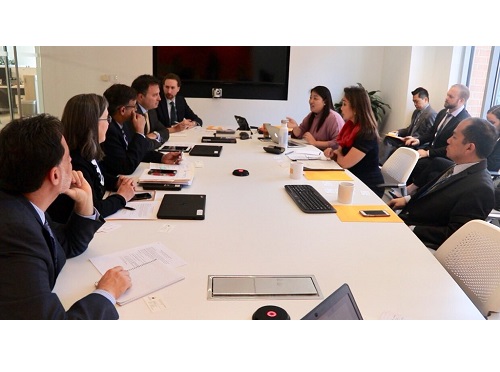
April 21, 2018 Saturday

April 21, 2018. The third day of the Spring Meetings hosted by the World Bank Group (WBG) and International Monetary Fund (IMF) in Washington, D.C. focused on social protection, climate adaptation, climate finance, US-PH socio-economic relations, and climate resilience.
Commissioner Rachel Herrera represents the Climate Change Commission (CCC) as part of the Philippine Delegation to the Spring Meetings, together with Budget Secretary Benjamin Diokno serving as Head of Delegation and Senator Loren Legarda as Alternate Head of the Philippine Delegation, as well as other delegation members from the Department of Finance (DOF) and National Economic and Development Authority (NEDA).
“The topics for our third day of the Spring Meetings have become more specific, but we see that climate change remains to be a central concern in the discussions. As climate change is a cross-cutting development issue, discussions on sustainability and inclusiveness must also be in the context of addressing climate change,” Herrera said.
The first event was the World Bank’s Technical Dialogue with the Philippine Delegation: Social Protection and Community-Driven Development (CDD), which discussed the bank’s long-running engagement with the country’s social welfare programs, such as the Pantawid Pamilya Pilipino Program (4Ps), Listahanan, and the Kapitbisig Laban Sa Kahirapan-Comprehensive and Integrated Delivery of Social Services (KALAHI-CIDSS).

According to the World Bank, the 4Ps, in particular, accounted for 25% in poverty reduction in the Philippines, despite the government allocating only .7% of its GDP to the program. This prompted Legarda to explore with the Department of Budget and Management (DBM) the feasibility of increasing the budget’s program to the ideal allocation of 1% of GDP.
Herrera also expressed that CDD programs, such as the KALAHI-CIDSS, should continue training and honing volunteers in the areas of disaster risk reduction and climate change adaptation and mitigation.
This event was followed by a meeting with Dr. Patrick Verkooijen, World Bank’s Special Representative for Climate Change, to discuss the proposed Global Commission on Adaptation (GCA), which is supported by World Bank President Jim Yong Kim and former United Nations Secretaries General Ban Ki-Moon and Kofi Annan, as well as climate leaders Christiana Figueres, former Executive Secretary of the UN Framework Convention on Climate Change (UNFCCC), and Feike Sijbesma, Global Climate Leader for the World Bank Group and Co-Chair of the High Level Assembly of the Carbon Pricing Leadership Coalition.
Herrera said that the GCA will further advance international negotiations on climate adaptation and resilience, and hopefully, spur and sustain talks on the issue of loss and damage.
Climate finance was one topic highlighted at the Roundtable with World Resources Institute (WRI), where Legarda provided a background on the history of the People Survival Fund (PSF), the country’s first climate finance mechanism dedicated to supporting local climate adaptation projects, and also expressed the urgent need for direct access of institutions to other climate finance mechanisms.
The WRI mentioned that the Vulnerable Twenty (V20), the sister initiative of the global alliance Climate Vulnerable Forum (CVF), could be the vehicle for the Philippines in voicing out the need for financial and technical assistance from developed countries for vulnerable countries to pursue climate mitigation within their respective countries.
At the Banyan Tree Leadership Forum: Roundtable Discussion with the Center for Strategic and International Studies (CSIS), co-sponsored by the US-Philippines Society, Legarda emphasized that the US and Philippines have a long history of cooperation in the fields of trade, security, human rights, national defense, infrastructure, and other investments.
Legarda said that the Philippines is endeavoring to attract more investments in innovative and inclusive industries, such as alternative vehicles and climate-change related projects—an aggressive push that the Duterte administration also wants to see in the agriculture sector with the adoption of globally-competitive agribusiness practices and spurring structural change in agriculture.
Commissioner Herrera also participated in the dialogue “The Future of Resilience: Banking on Cities,” which tackled key issues faced by major global cities in building climate resilience. She supported the notion that governments must build resilience of cities much earlier as two thirds of all people are projected to live in cities by 2050, which would make our cities become more concentrated, and thereby making their exposure to disaster and climate risks also higher.
“As we participate and learn from the knowledge and experiences from other countries, we also get to assess our own initiatives and commit to improve on them. While we have made significant strides in our work for climate adaptation and mitigation, we certainly need to strive harder to amplify our call for climate justice,” Herrera concluded.